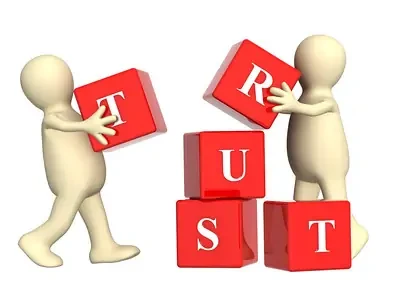There’s a lot of talk about trust — in politics, in business, in relationships. It’s one of those words that everyone uses, but few really stop to examine. “You have to trust me.” “I don’t trust the government.” “Trust has to be earned.” The word gets tossed around as if we all knew what it meant. But do we?
In relationships, trust is often equated with sexual fidelity. “Can I trust you?” really means, “Will you stay faithful?” That’s not unimportant, but is that all trust means — that someone won’t sleep with someone else? What about honesty, reliability, or kindness? A person can be sexually faithful yet emotionally manipulative, dishonest, or simply absent. And still we might say, “I trust them.” Clearly, our ideas of trust are both narrow and confused.
In friendships, trust often means confidentiality: “I can tell you something in confidence, and you won’t repeat it.” In families, it may mean dependability: “I can trust you to pick me up at the station.” In politics and business, it’s usually about credibility: “Can I trust what you say?” In religion, people speak of trusting in God, as if faith were a kind of insurance policy against uncertainty. And in the modern digital world, we hear about trust in institutions — banks, media, technology — where algorithms and passwords have replaced handshakes and shared values.
But if you look closely, all these forms of trust have one thing in common: they rely on an expectation of how others will behave. We trust someone because we assume they’ll act according to our standards — that they’ll be loyal, tell the truth, keep our secrets, deliver what they promise. Trust, in that sense, is really an extension of our own self-image. We project ourselves outward and hope that others will mirror us. And when they don’t, we feel betrayed.
At some point I realised that this expectation is absurd. Nobody can be a perfect proxy for me. Each person lives inside their own reality, their own fears, hopes, and interpretations. What I call “trust” is often just a disguised wish for control — a hope that the world will behave as I would, that others will think and act as I think and act. When they fail to do so, I call it “a breach of trust.” But what was really broken? The illusion that my expectations were reasonable.
So, if I can’t trust others to be me, can I at least trust myself? That sounds better, but even that collapses under scrutiny. For most of the time, I’m not fully conscious. I forget what matters. I make assumptions, act on emotion, repeat patterns I thought I’d outgrown. The idea that I can always trust myself is as unrealistic as the idea that others should always behave as I wish. My own mind is as unpredictable as anyone else’s.
So where does that leave trust? Do we abandon it altogether, and live behind emotional walls, suspicious of everyone and everything? No — that’s just fear wearing another disguise.
What I’ve come to see is that if I really want to experience trust, I have to turn it inward — not toward my personality or my ideas, but toward something within me that is constant. I can trust the fact that I am alive. I can trust my breath — it has never failed me, even when my mind has. I can trust the pulse of existence that animates me, the quiet intelligence that beats my heart, heals my wounds, and allows me to see, feel, and love. I can trust that — not because I understand it, but because it’s undeniable. It’s here now.
When I trust that — the divine, the animating principle, the simple fact of life — then trust is no longer about prediction or control. It’s about surrender. I no longer need others to conform to my expectations, or myself to be perfect. I can meet life as it unfolds, moment by moment, trusting the very ground of being itself.
From that place, relationships change. I can appreciate someone’s loyalty without demanding it. I can accept someone’s failure without feeling destroyed by it. I can see that others, like me, are doing their best with the awareness they have. Trust, then, becomes compassion — not a contract, but an understanding.
When people say, “Trust is hard to rebuild once it’s broken,” they are usually talking about the outer kind — the trust built on promises, rules, or roles. But the inner kind of trust, the trust in life itself, cannot be broken, because it isn’t based on conditions. It’s like breathing — it happens regardless of what anyone does. That kind of trust doesn’t depend on faith in human perfection; it’s rooted in the awareness that something deeper is already holding everything together.
Maybe that’s what real trust is: not believing that others will never hurt you, but knowing that, whatever happens, you will still be alive, still conscious, still capable of feeling peace. It’s a different kind of strength — one that doesn’t harden but softens, that doesn’t close but opens.
In that sense, to live in trust is to live in reality — not the shifting reality of promises and betrayals, but the quiet, steady reality of being itself. The breath that moves in and out. The presence that witnesses everything. The life that keeps flowing, no matter what stories we tell.
So yes, I’ve come to see that there’s nobody I can really trust — not in the way the world uses the word. And yet, there is something I trust completely. It’s in me, and it is me, and it is far greater than me. It’s the simple, miraculous fact of being alive.


Comments powered by CComment